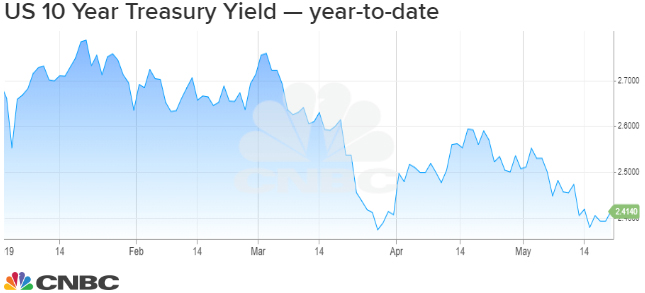Federal Reserve Chairman Jerome Powell and his central bank colleagues should take their cues from falling bond yields and lower short-term interest rates, economist Art Laffer told CNBC on Tuesday.
"I do think it's in the cards," said Laffer, formerly an economic advisor to presidents Donald Trump and Ronald Reagan and known for the Laffer Curve, a theory that argues that increasing tax rates beyond a certain point becomes counterproductive for raising tax revenue.
The bond market signals an increasing likelihood of the next Fed move being a reduction in the cost of borrowing money as the year unfolds, jumping to nearly a 70% chance for the central bank's policy meeting in December. In 2018, the Fed hiked rates four times to a target range of 2.25% to 2.5%.
The yield on the 10-year Treasury, trading around 2.43% Tuesday morning, has dropped nearly 10% from the beginning of the year as the S&P 500, even with the recent knock from China trade tensions, has increased about 13% in 2019.
"The Fed has always followed interest rates [in the bond market] not led them," Laffer said in a "Squawk Box" interview. "I think the chance of a lowering is quite high."

Laffer, co-author of the book "Trumponomics: Inside the America First Plan to Revive Our Economy," said the Fed should not be worried about stoking persistently low inflation by allowing the economy to continue to grow unfettered.
"You can have a very strong economy with low interest rates," said Laffer. Historically, as part of its dual mandate of controlling inflation and maximizing employment, the central bank has used higher interest rates to prevent the economy from overheating.
However, Laffer did concede that "inflation is not a simple thing to understand." He acknowledged that he was "totally wrong" about a decade ago when he predicted inflation was going to pick up due to the Fed's prolonged easy money policies aimed at boosting economic growth after the 2008 financial crisis.
On Friday on CNBC, Laffer's 'Trumponomics' co-author, Stephen Moore, also argued that central bankers should cut rates.
Moore, who earlier this month under pressure withdrew his name from consideration by President Donald Trump for a nomination to the Federal Reserve board, also believes the Fed should not be worried about stronger economic growth causing out-of-control inflation. "This is what my whole [Fed] campaign was about — that growth does not cause inflation," Moore said.
At the beginning of May, less than a week after first-quarter gross domestic product showed a 3.2% advance, the Fed voted to hold rates steady. Fed Chairman Jerome Powell, at his post-meeting news conference, appeared to put cold water on a rate cut, calling the factors that drove inflation lower "transient."


